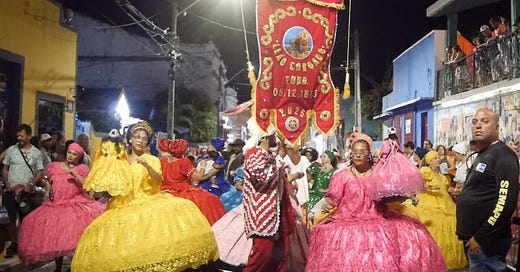Carnaval 2025 is kicking off this week in thousands of cities across Brazil. In honor of this, here is a story about Brazil’s oldest genre of Carnaval music. With three subgenres, Maracatu represents one of a half dozen styles of music that are only played during Carnaval in Pernambuco. The fact that carnavals in Pernambucan cities like Olinda, Recife, Paudalho and Bezerros have special dances, traditions and musical genres that only take place during this time of year is something commonly mentioned in the regional bar room arguments across Brazil this time of year on which cities have the best carnavals. This is my 30th carnaval in Brazil, and I think Olinda has one of the best. One reason for this is because of Maracatu. Here’s a news story I did for TeleSur English’s “From the South”. I’ll post the transcript below.
Narrator: Every year, during the week before carnaval, the streets of Olinda, the UNESCO designated World Heritage site founded in 1535, are filled with the sounds of Maracatu, Brazil's oldest genre of Carnaval music, as 10 groups or, "nations" as they are called, parade through the streets to a 17th Century church in a procession deeply connected to traditional Afro-Brazilian religions.
Karina Aguiar - Percussion Section Conductor, Leão Coroado Maracatu Nation
Maracatu was created as a form of disguising the temples of Candomblé and Jurema and other religions here during a time when they were outlawed. So Maracatu has been connected to the temples from its birth, but it's also a political way to continue doing what we do, whether it's religion or culture.
Narrator: The oldest written records of Maracatu in Pernambuco date from the year 1800, although it is believed that the tradition started decades earlier, by Congo people from what is now Northern Angola who were kidnapped and forced to work on the sugar plantations. The fact that Maracatu existed for over a century before slavery was outlawed is one reason it's viewed as a symbol of resistance to this day.
Italo Neri - Homen do Nordeste Museum
For a long time Maracatu was viewed publicly as only a Catholic tradition. This isn't true. It's a celebration that comes from African culture and it represents an attempt to keep the history of these people alive and relevant, to demonstrate that we have culture beyond what was imposed on us by the colonizers.
Narrator: As usual, the annual procession in Olinda, called "Night of the Silent Drums", was led by the city's oldest Maracatu nation which is still active, Leo Coroado, or "the Crowned Lion" - founded in 1863 and still going as strong as ever.
Manuela Ferreira - Queen of Leão Coroado Maracatu Nation
In Maracatu, the roles of the King and Queen serve as a playful critique of the Portuguese Court. For instance, one of the key requirements to become a Maracatu Queen is that you must be Black—a deliberate choice meant to highlight and challenge the legacy of the Portuguese colonizers who arrived here.
Narrator: This year Olinda's official carnaval activities will start on Thursday and continue for 5 days until Fat Tuesday - the day before the traditional start of Lent.
Brian Mier, TeleSur, Olinda





Rooting for Brian's article about street Carnival in Rio 2026